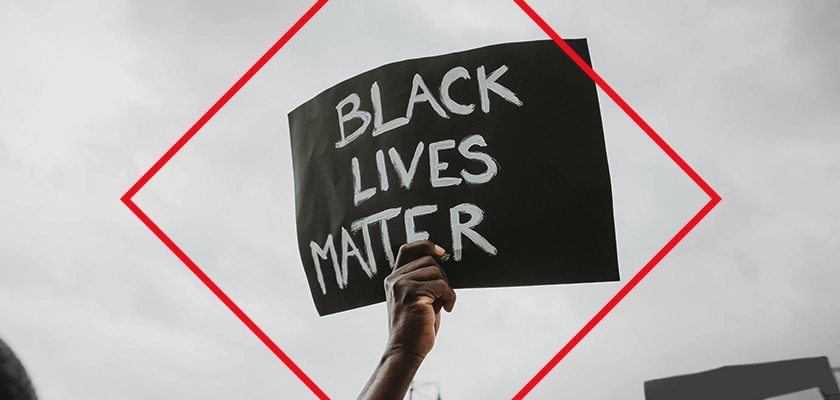"Black Lives Matter and Social Movements" - Richard Ellefritz, Ph.D. | October 2020
Striving to achieve social and economic changes in communities is not a new concept but for some, Black Lives Matter is a polarizing movement.
Assistant Professor of Sociology
University of the Bahamas

For sociologists, the question of social change is of the utmost importance because, like other people, we all want to know what the future holds. But sociologically, societal changes can profoundly affect all lives on Earth—just think of the difference of how we live in the 21st century compared to 10,000 BCE! This puts into question why the topic most often arises at the end instead of the beginning of standard textbooks in our discipline. One answer is because social change involves so many explanatory factors that all the material in the prior chapters factor into explaining the ever-present phenomenon of our changing social world.
Social scientists find it necessary to use a very large data set and measure many variables to track just one social change: changing social values—one notable finding is a global rise of tolerance. Racism, according to famed sociologist, Robin Williams (not to be confused with the actor and comedian), is among the core values in the United States of America, which contradicts the central values of democracy, liberty, equality, humanitarianism, and individualism in the U.S. society. Racist values, attitudes, beliefs, and behaviors have significantly changed over time, thanks in part to the abolitionist and civil rights movements of the 19th and 20th centuries, and have shifted even further in the 21st century.
The Black Lives Matter movement is a response to the increasing views that racism is a growing social problem in the U.S. (and world), but others, particularly conservatives and Republicans, cite a plethora of examples of how racial equality has been increasing in recent years. For example, individuals aligned with the values of or who affiliate with Black Lives Matter have recently engaged in one of the repertoires of contention of collective action, initiating a petition, to address racialized packaging used by the grocery store chain Trader Joe’s.
Along these lines, the backlash against brands like Goya through another repertoire of contention, the use of hashtags—in this case, #BoycottGOYA, for its alignment with President Trump—resulted in a countermovement effort to support the company by mass efforts to buy, consume, and donate the company’s products. Many corporations have begun to make public statements in their support of Black Lives Matter and racial equality, but many members of the public perceive these actions as resulting from social pressure rather than sincere concern for social justice, something sociology has been rooted in since its conception.
Social movements, such as Black Lives Matter (BLM) and the civil rights movement, are just one component of social change, but their importance lies in the fact that people voluntarily choose to join and engage in collective behavior to change (or resist) social conditions. Unlike, for example, technology-catalyzed changes that cause quantum leaps in the social organization of societies, some social movements cause only small changes.
These are called alternative social movements, and they intend to affect only some individuals with alternative policies, such as when Mothers Against Drunk Driving (MADD) sought to change behaviors in those who choose to drive while under the influence of alcohol. Seeking a deeper change in individuals is the goal of redemptive movements, such as how the founders of Alcohol Anonymous (AA) sought to lead individuals into recovery from alcoholism by fundamentally changing the inner-, spiritual self of individuals suffering from alcoholism by helping them form a personal relationship with a Higher Power.
Compare these to the American temperance movement, typologized as a reformative movement, which sought to, and eventually did, reform the U.S. social, cultural, economic, and political landscape with the 18th Amendment to the U.S. Constitution, i.e. the prohibition of alcohol. The temperance movement was met with heavy backlash by what are termed regressive, reactionary, or resistance movements that wanted, and eventually achieved, a return to the way things were with the 21st Amendment that repealed the 18th Amendment.
There are many more types of social movements, but these examples highlight how just one behavior, the consumption of alcohol, can be involved in different types and degrees of social change via the actions of various kinds of social movements. There is another type of social movement, though, which necessarily does not nor cannot seek to change just some individuals’ behaviors or to change just some social norms or political policies.
These are transformative movements, which seek to revolutionize society, such as when the American and French revolutionaries overthrew their governments in the 1700s. The movements of the 1960s—like the environmental, women’s rights, and anti-war/peace movements—were reform movements because even though they sought large-scale changes in society, the social structure would remain relatively the same overall.
With this in mind, read the following passage from the Black Lives Matter (BLM) website page, “What We Believe,” and decide whether they are seeking reformative or transformative changes in society:
“We are guided by the fact that all Black lives matter, regardless of actual or perceived sexual identity, gender identity, gender expression, economic status, ability, disability, religious beliefs or disbeliefs, immigration status, or location.
We make space for transgender brothers and sisters to participate and lead. We are self-reflexive and do the work required to dismantle cisgender privilege and uplift Black trans folk, especially Black trans women who continue to be disproportionately impacted by trans-antagonistic violence.
We build a space that affirms Black women and is free from sexism, misogyny, and environments in which men are centered.
We practice empathy. We engage comrades with the intent to learn about and connect with their contexts.
We make our spaces family-friendly and enable parents to fully participate with their children. We dismantle the patriarchal practice that requires mothers to work “double shifts” so that they can mother in private even as they participate in public justice work. We disrupt the Western-prescribed nuclear family structure requirement by supporting each other as extended families and “villages” that collectively care for one another, especially our children, to the degree that mothers, parents, and children are comfortable. We foster a queer‐affirming network.
When we gather, we do so intending to free ourselves from the tight grip of heteronormative thinking, or rather, the belief that all in the world are heterosexual (unless s/he or they disclose otherwise).”
This passage highlights the demographic inclusiveness of BLM, as well as the program for changing patriarchal, heteronormative, and familial social structures. In another passage, BLM states that participants in the movement “work vigorously for freedom and justice for Black people and, by extension, all people.” This inclusiveness of all people—regardless of position in the social structure, i.e. social status—contrasts with the opposition to those people who are part of the social systems they seek to change.
This has resulted in reactionary movements that use hashtags like #AllLivesMatter and #BlueLivesMatter, which reveal an ideological divide that tends to run down partisan lines.
Reactionaries who use such hashtags as #AllLivesMatter argue that polls show a majority of Americans align themselves closer to that belief rather than #BlackLivesMatter because the term is more inclusive and less divisive. However, the popularity of the Black Lives Matter movement has increased dramatically since its 2014 inception, especially among Democrats and those with left-leaning ideologies. Some in the media call out the #AllLivesMatter supporters to prove their point by also supporting #BlackLivesMatter, but reactions to this include reservations about the Marxist origins and leftist leanings of the Black Lives Matter movement.
The Black Lives Matter movement has led to changes in society that go beyond the murals and slogans painted onto city streets. In some Christian churches, sermons about systemic racism now have resonance with younger and broader congregations, and the protests, marches, and demonstrations by movement members are leading to national policy changes that meet at least some of the movement’s goals, i.e. ending targeted excessive use of force by police toward people of color and abolishing systemic racism. However, with such breadth and depth to its inclusiveness and goals, as well as the sheer diversity of its movement members’ behaviors and attitudes, the very meaning of Black Lives Matter is contested beyond ideological and partisan grounds.
What does “Black Lives Matter” mean to you? What does it mean to others in society, and what does it mean for society? What type of social movement is it, or is typifying it unrealistic by the typical sociological standards stated above? Are the people opposed to Black Lives Matter fundamentally the same as those who use hashtags like #AllLivesMatter, i.e. is there a difference? Lastly, as is the question with any other social movement, what might happen if and when the movement meets its stated goals? What kind of world will that produce?
Questions for Discussion
- What does “Black Lives Matter” mean to you?
- What type of social movement is it, or is typifying it unrealistic by the typical sociological standards stated above?
- What might happen if and when the movement meets its stated goals? What kind of world will that produce?



